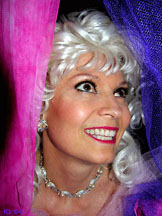|
IONA MILLER E-mail
IONA@IONAMILLER.ORG

My Address
SOUTHERN OREGON, USA
Online Contact Info
iona@ionamiller.org
IONA MILLER HOMEPAGE: IONASPHERE
ionamiller.org
Uncertainty is the zeitgeist of our day. We are anxious and unsure. We face global warming, economic and environmental deterioration, emerging infections and incurable viruses, pandemics, bioterrorism, wars, urban violence, soil and water depletion, rampant population growth, genetically-engineered food and organisms, hazardous waste, and profound doubts about our earth's ability to continue to sustain life. Much of earth's life is already going extinct, and we wonder about own own and our grandchildren's futures, health, and well-being. Many of us feel the impact as loss of our cherished dreams of a better future.
We did not anticipate this transition from the arrogant certainty of the rational enlightenment promise to disquieting uncertainty. We have realized only empty promises of solutions to life's fundamental problems, like world health, food, and peace. Despite all our knowledge we have not been able to control or dominate our environment successfully. Knowledge is not wisdom, or even understanding. There is a deeper current in life and it is embodied in Mystery-- the unpredictable, the unknown, and perhaps unknowable.
Chaos Theory (CT) is the third revolution in science after relativity and quantum theory. It is the prime source of unpredictability in the macrocosmic world and the human scale, formerly described only by classical physics. Chaos and complexity is nature's own way of organizing systems and creating structure. All systems emerge from and eventually dissolve back into chaos.
Chaos is ubiquitous in nature, but it was missed by science due to the overwhelming complexity of detecting its underlying pattern and purpose. Chaos theory means dynamic processes are deterministic though unpredictable. Much the same can be said for its discovery in human physiology and psychology.
It is well established now that most dynamics in nature, ranging from the orbits of planets to behavioral adjustments in life, are essentially chaotic. We are chaotic systems ourselves, and chaotic systems exhibit holistic behavior. Holism sees the world in all its diversity as connected through complex feedback loops. Through the chaotic process of emergence, order appears spontaneously or even instantly within a system.
The conventional medical model has failed many of us. Holistic health systems embrace the mindbody paradigm, but that does not necessarily mean we should all rush out to substitute "foreign" or alternative therapies for conventional medical wisdom. Generally, these modalities are complementary to biomedical care. However, the
holistic scientific metaphor provided by chaos theory allows us to describe the psyche in terms congruent with physical reality. This is simply the way nature works, and the way our nature works, too. It provides a comprehensive psychophysical metaphor for uniting physical, emotional, mental, and spiritual realities.
Holism is a paradigm - a worldview, which is equally applicable to the universe and our human existence. Chaos Theory is not a metaphor, per se, but functions as a science metaphor to describe systems, organisms, and dynamic behavior, including complex adaptation. It describes how order emerges from chaos. People often spontaneously
incorporate science metaphors in their self-narratives, using such terms as "black holes" and "melt downs," or "quantum leaps," etc. to describe their feelings or personal dynamics. And the same can be done with aspects of chaos theory which can describe how we adapt to life at the edge of chaos in our own unique way.
Paradigms from one field of science often interpenetrate others. Because the findings are more than metaphorical, they translate across disciplines. Metaphors reflect the interdependency of mind and body, and the embodied nature of metaphor holistically reflects the unity of individual and world. Embodied knowledge reflects our shifting understandings of the body. Metaphors of chaos are as prevalent in our life trajectory as the explicit chaotic patterns are in our physiology (in our brains, hearts, and metabolic systems, etc.). The events of our lives become embedded in our structure and metabolism. We might call this embodiment "metaphorms."
Various forms of metaphor therapy can help us heal and adapt in the recovery process, giving our psyche a voice. With the advent of chaos theory and complexity theory, universally negative attitudes toward chaos are changing slowly but surely, at least in some individuals. We are learning to consciously accept chaos, and intuit that it also
has value. Linear and deterministic theory is on the decline in favor of nonlinearity, fragmentation, multiplicity, iteration, complex feedback loops, and indeterminacy.
This ascendancy of the scientific paradigm of chaos includes medical uncertainty, both for practitioners and patients, who must learn to deal creatively with chaos, tolerate ambiguity, and respect the unapparent. Our sense of control over our external world is a destructive illusion. As we come to understand that disruption is part of the creative cycle, we learn to understand how "emergency" is part of the creative process of "emergence" of renewal and new potential.
Over time we can expect this paradigmatic shift to penetrate more deeply into the cultural fabric of our lives and an integrative health system. Chaos theory, systems theory, and complexity theory have shown us that self-organizing order emerges from chaos, and is thus the paradigm of the natural healing process. It describes the dissolution or fragmentation and reconstruction of the volitional self. It helps us attach a more positive valence to disruptions of our mortal human lives, either through illness or misfortune.
|


